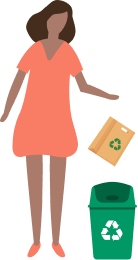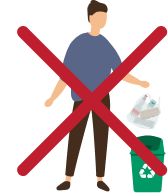Frequently Asked Questions
Absolutely! Steel Chill-Cups™ are 100% recyclable. In fact, because disposable Steel Chill-Cups™ are made from steel they have the best chance of being successfully recycled. What's more, unlike plastic and paper, steel can be infinitely recycled, which means your recycled Steel Chill-Cups™ could have a new life as a bridge, car, or anything else made of steel.
The ultra-thin non-BPA white lining is PET (Polyethylene terephthalate). It provides you with a clean taste and prevents steel from rusting. The food grade PET does not interfere with the recyclability of the cup.
Each community has its own curbside recycling program. If your community has one, each program has a unique list of materials it will accept. But, steel and aluminum food cans and the most common beverage containers (e.g. aluminum and PET) are universally accepted across curbside recycling programs. Other types of materials, like other types of plastics, pouches, cartons, etc. are more often not accepted and can potentially end up in the landfall despite recycling claims. That is why it's very important to check with your waste management company for a list of approved materials it will accept.
Go to the website for the local recycling program or company that collects your recyclables or trash. They should provide a list of the specific materials collected for recycling in your community. Local government websites often include this information as well. Another great resource to look at is: www.berecycled.org. Be sure to type in your zip code to learn what is recycled in your community.

Putting items in the recycling bin that are not wanted by the recycling program creates more problems for the Material Recovery Facility (MRF). Unwanted materials can damage sorting equipment and slow sorting processes (i.e. plastic bags get tangled in the equipment). The removal of unwanted items, deemed contaminants, require more manual sorting driving up recycling program costs which in some cases has resulted in the closure of community recycling programs. That is why it's important to check with your local recycling program to ensure materials can be sorted efficiently.

Unfortunately, no. Plastic bags create problems for Material Recovery Facilities (MRFs) that sort materials. If you bag your recyclables and place that bag in the recycling bin, it's more likely the whole bag will end up in the landfill. The main reason for this is, MRF's don't have equipment that can tear the bags open. Therefore, to tear the bag, they would need manual labor to do it. As the cost of sorting material rises, the less economically attractive it will be for MRF's to operate.
Wanting to recycle as much as possible is admirable, but it is best to check with local Material Recovery Facility (MRF) for a list of accepted materials. If you are still uncertain about a particular material, you should always discard it in the trash bin and not recycling bin. There is a term in the industry called “wish-cycling”, a practice that significantly reduces recycling efficiencies. Less efficient operations can negatively impact amounts of materials that do get recycled. Placing unwanted materials in the recycling bin only means that material is taking a detour before it ends up in the landfill. The very best practice is to learn what specific materials are collected by your community and only place those items in the recycling bin.